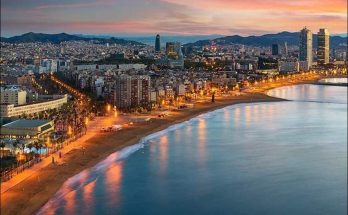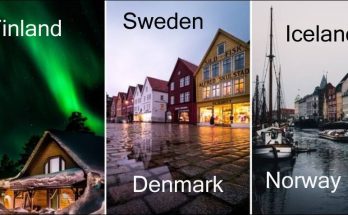Americans of today have become the world’s wanderers. The character depicted in Sue’s great novel has its modern counterpart, not only throughout the United States, but all over the globe, with baggage marked “From America,” and destination everywhere. Another human wave flows from city to sea and mountain with the approach of summer, and crowds every outgoing ship bound for the Old World. This national restlessness has aided in coining such words as “commuter” and “suburbanite,” for the daily movement in and out of the great cities of the country is partly the result of the desire “to go somewhere.”
The passing of the multitude to and fro has created the business of travel and developed it into a mechanism which is wonderful in its movements, considering the comparatively short period of its existence. It devises ways and means for all classes and to suit all purses. By it the wealthy man secures his private car, in which to flee from the grasp of the frost king to the shade of palmetto and pine. It provides the clerk with his half seat in the common coach, or conducts the hundred or thousand in the excursion party through the highway of Europe, or around the world. In 1841 that 600 people were taken from Leicester to Loughborough on the first excursion train on record.
It is worth while to turn a few pages of British history, for here originated the system that has since spread throughout the New World as well as the Old. Until the printer, Cook, took his townsfolk to the Father Matthew meeting at Loughborough the excursion train was unknown. The talk it created set people to thinking, and from this obscure village developed the idea of modern travel. Up to that time intercourse between the countries of the Kingdom was confined principally to visits among one’s relatives, the trips of the commercial agents and government representatives.
The railroads terminated south of the Scotch borderland; the traveler to the North Country had his choice of stage coach or steamer from the end of the track. To the average Englishman, both Scotland and Wales were almost unknown countries. Popular travel produced a revolution which converted Highland and Lowland alike into a summer holiday encampment for the people of the middle and southern England. It built hotels on hillside and in valley, and bordered the seacoast with season resorts.
The throng of pleasure-seekers spread throughout North Wales as well, and even into Ireland. In spite of the present attraction of English tourists to the Continent and the United States, it is estimated that the yearly “bank holidays” find 200,000 Londoners alone transferring their homes temporarily to the Land of Burns and the Bard of Snowden.
The few miles across the English Channel, until 1856, had barred all but the nobility and wealthier British people from visiting the Continent for pleasure, and the comparative few who ventured through northern or southern Europe were considered by the hotelkeepers as their legitimate prey, and compelled to pay exorbitant prices in city and hamlet alike; perhaps mine host had in mind traditions of former days when the earl or duke, with his retinue, rode from town to town demanding the best the inn afforded, and expecting nothing out of the purse of gold thrown down in payment. But with the advent of the tourist agent came a change which benefited host and guest alike, for what was lost in the reduction of charges was made up in the increased patronage.
Another exposition—that in Paris in 1867—caused the tour promoters of the Old World to think of crossing the Atlantic. A few trips to such resorts as Niagara and Saratoga had been arranged by Americans, but the business of travel, as conducted abroad, was practically unknown.
Less than a thousand people went to the other side as a result of the reduced steamship rates and other inducements; but those who attended the great fair returned to become personal advertisements of the modern idea. The average American who had gone abroad previously was possessed of a bank account which could withstand the heavy inroads of the foreign landlords; but few cared to repeat a journey which was attended with such discomfort. Thanks to the tourist agent, the visitors to Paris were relieved of much of the trouble with which those who had gone before them were afflicted.
The fortunate combination of scenery and history possessed by the Old World has always been enticing, and the public was ready to welcome any assistance in smoothing the way to reach it. Consequently it is not strange that each year, with a few exceptions, since the sixties has witnessed a steadily increasing exodus to the other side, and the trip to Europe, once considered the epoch of a lifetime, has become an ordinary event—to be regarded of as little moment as the journey between city and city.
The modern system of travel has planned its every detail with admirable nicety. Enter one of the offices to be found in the important cities, and tell the man behind the desk of your proposed journey. In exchange for the check or bank bills, he gives you a piece of pasteboard which will carry you by railroad and steamer to every city in the civilized world, if you so desire. Another package of pasteboard slips pays for food and shelter wherever you may desire it, in the heart of London or on the shore of the Nile. Europe or around the world, as you choose.
If one wants a special car in which to cross the continent, over the wires goes a message, and in an hour it may be linked to a train on its way to meet the tourist, or bearing him on his journey, provided with chef and porter, supplied with food and bedding— turned into a traveling home, in which he can live a week or month, as his purse allows. At a day’s notice a special train can be provided—a hotel on wheels with its bedrooms, library, dining-room, boudoir, and even barber shop. And in the same office where the millionaire engages his “special” the clerk with his month’s vacation secures his bunk or railroad excursion ticket, and pays for his daily meals and lodging.
The modern agency for our pleasure is ubiquitous in every sense of the word. It has developed into an encyclopedia of geography and history so complete that any of its representatives can not only give the location of a particular point of interest, but advise the best land and sea routes to be taken to reach it, and the hour of arrival and departure of train or steamer. The upto-date agency has men, who speak every modern language, stationed in all the important foreign communities to answer inquiries as well as to sell tickets.
At these offices the stranger can write and mail his letters, have his mail forwarded to him, obtain information as to the best hotels, be directed to the most reliable shops, have his money and jewelry cared for while in the city, and perhaps get a glance at the home newspapers. After a few weeks abroad he soon comes to look upon these agencies as links which connect him with the far away home land, and he notes their signs with a feeling of gratitude—here is something which is not entirely foreign.
In some countries where the native hotels are not satisfactory the tourist company has built hostelries of its own. Banking departments, where the American dollar or the English pound can be exchanged Euro, form another branch of the business that is welcomed, as is shown by the report of one concern which in a year changed half a million in American cash for its patrons.
The machinery of travel, too, has smoothed the path of the modern wanderer in more than one sense. It has built ways of stone and steel to enable him to reach some attraction of nature hitherto almost inaccessible The cable car with its uniformed conductors ascends the lava-lined sides of Vesuvius, and you can dine at a restaurant nearly on the brink of the smoking crater.
The hum of the trolley is heard among the palms of Egypt, in sight of the tombs of the Pharaohs. The visitor in New England fans himself in the summer heat at the foot of Mount Washington, and a half hour later buttons his overcoat around his throat as he alights from the car in the region of winter on its summit. The “cog-wheel” route up Pike’s Peak has divested it of some of its fascination—for danger is often tempting—but it is far more comfortable to rise above the clouds seated in a cushioned chair than plod along the rocky road, the day’s journey required, afoot or ahorse.
Traversing a part of Florida is a railroad originally called the “Millionaire Line,” because a millionaire constructed it, and men of millions reached the American Riviera by it. Five hundred miles in length, it was built solely in the interest of the tourist at a cost of over five millions of dollars. But its promoter had the satisfaction of knowing that it revolutionized the mode of reaching the land beyond the frost line and acquainted the American people with a region which before had been almost as unknown as the wilds of Africa. The company’s yearly earnings prove that its enterprise was not unprofitable, for it has gradually changed into a highway, for the masses as well as the classes.
Nature’s attractions as an inducement to the seeker for variety. With the beginning of each season those remarkable people, the modern passenger agents—vie with each other in the production of pamphlets, even books of generous size, profusely illustrated in various colors. Ten thousand, perhaps a hundred thousand, of a single issue may be scattered over the country in the time-table racks. The preparation of railroad and steamboat literature has become an important part of the machinery of the passenger department—principally to secure the interest of the tourist.
But remarkable as has been the activity of railroad managers in the promotion of the tourist movement, the gaze must be turned seaward to fully appreciate its present dimensions. In a single month of spring or early summer fifty steamships leave New York alone. On a Saturday, a procession of ten great liners may be seen wending their way through “The Narrows.” As the purser records tickets from “upper deck” to steerage, he expects to find at least ninetenths having tourist transportation; for the Italian fruit vendor, who has saved enough to visit the old home once more, realizes the advantages of the system as well as the banker who engages his suite of cabins.
The tourist agent and the transportation company have provided all of these facilities naturally for their own profit, but in so doing they have been benefactors. The opportunity for education by travel has been placed within reach of a multitude of Anglo-Saxons who could not avail themselves of it otherwise. The Briton has gained knowledge of America and Americans, and the American has gained a knowledge of Great Britain and the Britons which could not be obtained in a life-time study of history.
The personal contact with not only the people but the manners and customs of the Old World has broadened the tourist from this side to a deeper appreciation of his own land. He has also acquired a fund of information not to be found within the book covers, which is beyond price, for the eye and ear note a thousand sights and sounds daily, which combine to make a most valuable history.
Views: 137




